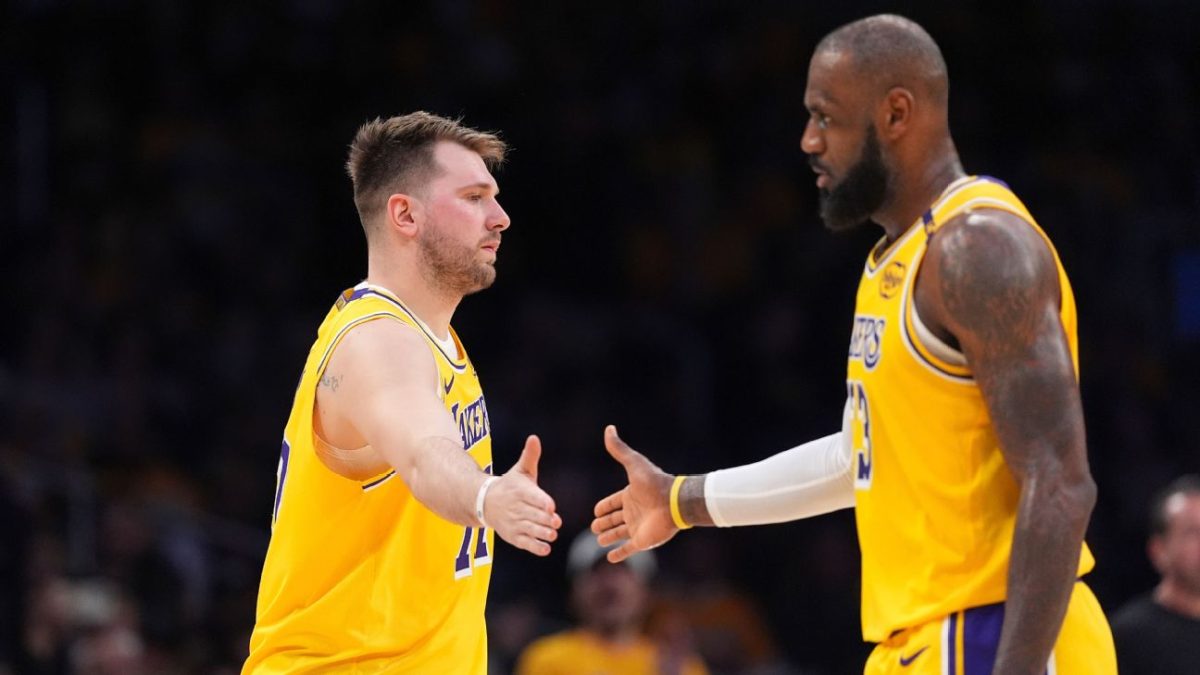It was a chilly Saturday. Most people were at home spending time with their family this evening, perhaps watching Nikola Jokić put up his 152nd career triple-double as the Nuggets held off a late Hornets surge. Into this perfectly normal evening that opened February for plenty of people hoping to close off their week, Lakers GM Rob Pelinka chose to drop the biggest bombshell of the last decade in sports.
It was done: the Los Angeles Lakers had traded their star center, Anthony “AD” Davis, for one of the greatest young talents in the league: Luka Dončić, alias Luka Magic, and Max Christie, an up-and-coming shooting guard who recently caught the attention of the media as a versatile all-rounder who can slot well into the team.
Beyond the stats, witnessing a superstar-for-superstar trade is highly uncommon, and given both Dončić’s statue as a player and his destination, this trade has basketball fans scratching their heads as to why the Mavericks would ever take such a deal.
What does this mean for the Mavericks?
At trade time, the Mavericks were mainly known as a playmaking team that revolved around Dončić’s play, but with their franchise player gone, many understandably-shocked Mavericks fans have criticized the team for this trade. Nor is the criticism limited to fans: many Dallas star players, like Klay Thompson, and Kyrie Irving, rejected contracts that would earn them millions because they believed that Dončić’s leadership and playmaking would net the Mavericks a championship. However, as Dončić went out the door, so did the team’s charm . . . and their ability to win games.
So: why? Why would the Mavericks trade their franchise player? No one truly knows what really sparked the trade, though there are conspiracy theories floating around, and the Mavs’ official answer did nothing to stop them. Officially, the team stated that Dončić had little to no conditioning discipline, and that his health has been slowly declining below the Mavericks’ standards. Put simply, this claim makes no sense: they have quite literally traded the face of their team over dieting issues.
Much more key to this puzzle is the fact that Dončić was close to getting his supermax contract, which would guarantee him $345 million for a 5-year extension. That may sound hefty to the average person, but the casino family that currently owns the Mavericks can easily afford that paycheck for the face of their team. Mark Cuban, prior owner (and current minority owner) of the team, has been quoted saying that he would never let Dončić leave the Mavericks, and that he is one of Dončić’s biggest supporters. Regardless, no one in the Mavs FO, including GM Nico Harrison, has provided a direct answer that explains this baffling decision.
Do the Lakers have an All-Star team?
With the current calls that Pelinka has been making to teams across the NBA, it is extremely likely that the Lakers will end the season with yet another championship.
Among the highlights of Dončić’s Lakers debut, where he now gets to play alongside LeBron, one moment has gone especially viral and reassured Lakers fans that they are in for a treat. When Luka rebounds the ball off the board, he looks up immediately and sees a wide-open LeBron. Immediately his eyes open, and some fans speculate that he may be thinking to himself that “we are really winning this championship.” With such a clear opportunity, Dončić passes to LeBron and they pull off a fastbreak, which is one of the highlights of the game.
Through his debut and his stunning performance, analysts have seen how Dončić is able to adapt so well and work with centers, and work with LeBron, further proving why he is one of the best playmakers in the league.
However, even with their natural choreography, the Lakers desperately needed a center to fill Anthony Davis’ shoes, and work well to Dončić’s fierce playstyle. Pelinka answered these prayers after a possible trade for Mark Williams fell through due to medical issues by signing 7’0″ Alex Len, a big man to fill the space Anthony Davis left on the roster and work with the “Magic.” Bolstered by this newfound support, the Lakers nonetheless need to change rapidly to reflect their roster changes as they gear up towards the Finals, and get their head in the game with one of the greatest line-ups of the last two decades.
You’re all wondering the same thing we are: how did the Lakers do it? How did they acquire a 25-year-old Luka Dončić, widely regarded as one of the best players in the NBA, to join a loaded roster? Is Rob Pelinka simply him?
